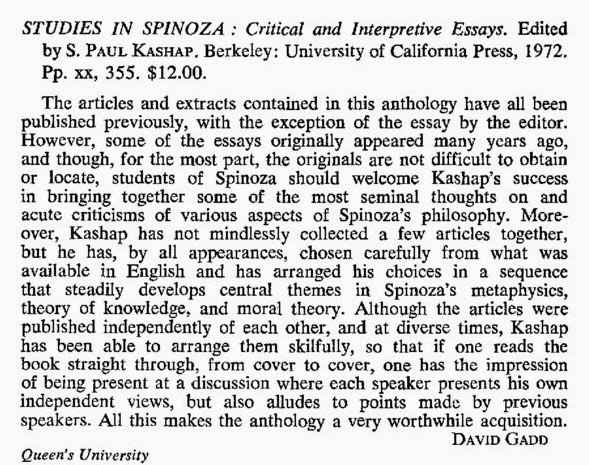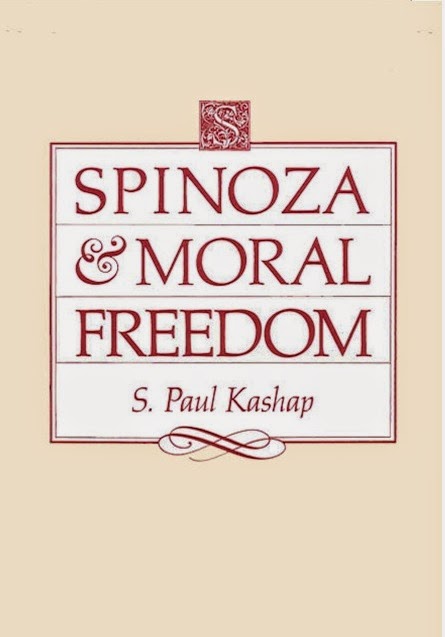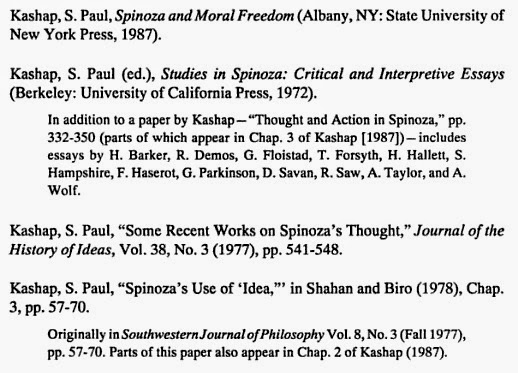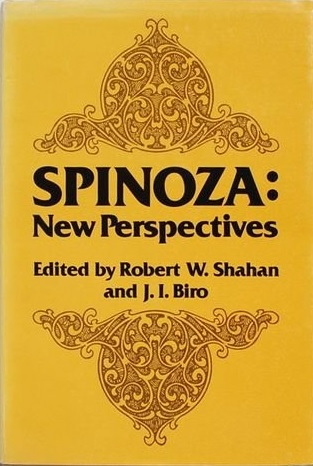S. Paul Kashap redigeerde als eerste een verzamelbundel met artikelen over Spinoza
In ieder geval in de Angelsaksische wereld en misschien wel in de hele wereld. Ik heb er al vaak gebruik van gemaakt en naar verwezen, maar het wordt tijd voor een apart blog erover.
S. Paul Kashap was Professor of Philosophy aan de University of California, Santa Cruz, en is nu Professor Emeritus van die universiteit [cf.]
 Hij redigeerde "the first collection ever of articles
on Spinoza," volgens Kashap zelf in “Some Recent Works on Spinoza's
Thought." [cf. hierna]
Hij redigeerde "the first collection ever of articles
on Spinoza," volgens Kashap zelf in “Some Recent Works on Spinoza's
Thought." [cf. hierna]
S. Paul Kashap, Studies in Spinoza, Critical and Interpretive Essays. Berkeley, University of California Press, 1972 - 355 pagina's
Table
of contents
Introduction S. PAUL KASHAP
Spinoza's Doctrine of God in Relation to His Conception of Causality T. M.
FORSYTH
Spinoza's Conception of the Attributes of Substance A WOLF
Spinoza's Definition of Attribute FRANCIS S. HASEROT
Spinoza and the Status of Universals FRANCIS S. HASEROT
Spinoza and Time S. ALEXANDER
Personal Identity in Spinoza RUTH L. SAW
Notes on the Second Part of Spinoza's Ethics (I) H. BARKER
Notes on the Second Part of Spinoza's Ethics (II) H. BARKER
Notes on the Second Part of Spinoza's Ethics (III) H. BARKER
On a Reputed Equivoque in the Philosophy of Spinoza H.F. HALLETT
Some Incoherencies in Spinozism (I) A. E. TAYLOR
Truth and Falsity in Spinoza G.H.R. PARKINSON
Spinoza and Language DAVID SAVAN
Spinoza's Theory of Knowledge Applied to
the Ethics GUTTORM FLOISTAD
Spinoza's Doctrine of Privation RAPHAEL DEMOS
Some Incoherencies in Spinozism (II) A. E. TAYLOR
Spinoza and the Idea of Freedom STUART HAMPSHIRE
Thought and Action in Spinoza S. PAUL KASHAP
Dat boek is al een hele poos out of print en is bij de uitgever en bij books.google in z’n geheel online te lezen. Vele artikelen die erin verzameld zijn worden nog steeds geciteerd. David Gadd gaf de volgende korte, treffende bespreking in: Dialogue [Volume 13 / Issue 01 / March 1974, pp 184-184 – [html]

Hier ook het review door H. S. HARRIS
This volume contains eighteen essays on the philosophy of Spinoza, of which only the last, contributed by Kashap himself, has never appeared before. The oldest is excerpted from S. Alexander's book on Spinoza and Time (1921). Next in seniority is an essay by A. Wolf on "Spinoza's Conception of the Attributes" which appeared in 1927. Of the rest, one is a chapter from G. H. R. Parkinson's book Spinoza's Theory of Knowledge (1954). The other fourteen appeared in various journals between 1937 and 1969. Kashap has supplied a brief descriptive introduction, and a selective bibliography of books and articles on Spinoza in English. The editor claims that "The final selection of the essays was made not so much from the point of view of their textual criticism but on the basis of their ability to advance one's philosophical appreciation of Spinoza's thought" (xiv). This is hardly true of Alexander's essay, which seeks to make Spinoza's ideas over for a new age. But the main lesson of the volume is that one can only really advance one's appreciation of Spinoza's thought through close textual criticism. Certainly this is true where one's "appreciation" is more negative than positive. This becomes evident when we compare A. E. Taylor's two articles on "Some Incoherences in Spinozism," with H. Barker's "Notes on the second Part of Spinoza's Ethics" (three articles which form a connected whole.) The main problems raised by Taylor are more adequately discussed elsewhere in the volume, by critics who were more closely concerned with what Spinoza actually said - compare, for instance, the essay on "Personal Identity in Spinoza" by Ruth Saw. Barker's essays on the other hand, are a marvellous compendium of the difficulties that a plain common-sense reading of Spinoza's text will generate.1) The kind of value that it can have in "advancing the philosophical appreciation" of those who do not believe that Spinoza's thought is hopelessly incoherent, is aptly illustrated by the solution of one of Barker's main difficulties offered by H. F. Hallett (in the article that immediately follows.) Hallett's article, however, illustrates the danger inherent in a sympathetic interpretation which does not stay close enough to the text; for much of what he says will scarcely make sense to the plain common-sense ear. A more extreme example of this fault is offered by the second of the two essays by F. S. Haserot, who combines a painstaking concern with Spinoza's text that is entirely admirable, with a penchant for generalization about all other philosophies that is wholly regrettable. The question of how we are to understand Spinoza's use of language is necessarily central to all of the "textual criticism" that the volume contains. This problem is addressed directly by David Savan. Savan's article is itself discussed, tangentially, by Guttorm FlØstad. But for some unfathomable reason Kashap did not include Parkinson's article on the topic, which takes issue directly with Savan. His decision to reprint a chapter of Parkinson's book - which is still readily available, and hardly likely to be overlooked by anyone interested, was already a mystery. But this omission is, I think, an outright blunder. It is also a great pity because, as I have indicated, the existence of a real dialogue between the different contributions is what makes the book valuable (as it undoubtedly is.)
H. S. HARRIS.
YORK UNIVERSITY, GLENDON COLLEGE, TORONTO.
1 It is a pity that Kashap did not supply an English translation of Barker's copious quotations from German commentators.
In: Philosophy and Phenomenological Research, Vol. 35, No. 2 (Dec., 1974), pp. 280-281
* * *
Z'n overige Spinoza-werk:
Paul Kashap, "Some Recent Works on Spinoza's Thought." In: Journal of the History of Ideas, Volume 38, Issue 3 (jul-sept. 1977), p. 541-548 [PDF] Hierin dus de bovengeciteerde zin: "the first collection ever of articles on Spinoza." Verder bespreekt hij een aantal toen recent uitgekomen boeken over Spinoza.
 Kashap, Paul S., "Spinoza's Use of 'Idea'" in:
Spinoza: New Perspectives / Ed. by Robert W. Shahan und J. J. Biro. - Norman :
University of Oklahoma Press, 1978, 57-70.
Kashap, Paul S., "Spinoza's Use of 'Idea'" in:
Spinoza: New Perspectives / Ed. by Robert W. Shahan und J. J. Biro. - Norman :
University of Oklahoma Press, 1978, 57-70.
S. Paul Kashap, Spinoza and Moral Freedom. SUNY Series in Philosophy, 1987 – books.google. Hierover was een reviewer minder te spreken [cf.]
Zie hoe z'n werk vermeld wordt in: Wayne I. Boucher, Spinoza in English: A Bibliography from the Seventeenth Century to the Present [cf.]:

____________________________________
Hieraan voeg ik 13-3-2017 toe dat enige jaren na de eerste reader verscheen:
Robert W. Shahan & J. I. Biro (Ed.) Spinoza: New Perspectives. University of Oklahoma Press, first edition March 1978 [cf. Amazon]
%20Spinoza_New%20Perspectives.%20.jpg)
Daarin o.a.
David Lachterman, “The Physics of Spinoza's Ethics,” in Spinoza: New Perspectives, ed. Robert W. Shahan and J. I. Biro. Norman: University of Oklahoma Press, 1980, 71–112. [oorspr. in: The Southwestern Journal of Philosophy 8 (3): 71-111 (1977) [cf.]
Daarop verscheen enige jaren later deze reactie:
HASSING, R. F., "The Use and Non-Use of Physics in Spinoza's Ethics." In: The Southwestern Journal of Philosophy, Vol. 11, No. 2 (SUMMER, 1980), pp. 41-70
Cf. ook blog van 14-03-2017: Een Spinoza-special van 40 jaar geleden


Reacties
Dag Stan,
Hier een link voor de liefhebbers: http://bookos-z1.org/s/?q=Kashap&t=0
Adelin 12-03-2015 @ 10:53
Dankje, Adelin,
Ik was lang niet bij Bookos geweest - zie dat ze nu registratie vragen.
Stan Verdult 12-03-2015 @ 13:01